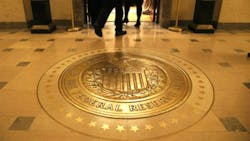WASHINGTON—Federal Reserve policymakers favored caution last month about raising interest rates as they weighed weak spots in the economy and foreign risks, minutes to the meeting showed Wednesday.
Participants at the June 16-17 Federal Open Market Committee meeting decided to leave the benchmark zero-level interest rate unchanged, as expected, as the economy was rebounding from a tough first quarter.
According to the minutes, to decide on raising rates, "many participants" said they "would need additional information indicating that economic growth was strengthening, that labor market conditions were continuing to improve, and that inflation was moving back toward the committee's objective."
Since late 2008, the Fed has kept the federal funds rate pegged between zero and 0.25% to ease credit and support the economy's recovery from the severe 2008-2009 recession.
The minutes revealed an overriding concern about raising rates too quickly, risking an upset of the economy's moderate recovery from the Great Recession.
"Most participants judged that the conditions for policy firming had not yet been achieved; a number of them cautioned against a premature decision," the minutes said.
The Fed has signaled its first rate hike in nine years would likely come this year. Many analysts have forecast the timing as soon as the FOMC meeting in September.
Recent market speculation has put that timing back a bit, to December or even 2016, amid uncertainties caused by the Greek debt crisis and China's slowing growth and financial system stress.
According to the minutes, Fed policymakers were also concerned about "the potential erosion of the committee's credibility" if inflation were to persist below the central bank's 2% target, and also about their limited ability to use policy to counter negative shocks to inflation and economic activity.
The Fed has insisted inflation would eventually rise after "transitory" effects, such as lower oil prices, dissipate.
The Fed's main focus in the recovery after the Great Recession -- maximum employment -- was getting closer to achievement but the improvement was seen as uneven.
"Several participants pointed out that, even with the recent upturn, wage increases remain subdued," the minutes said.
Developments overseas, particularly in Greece and China, were on the radar of the FOMC participants last month as they weighed a rate liftoff.
"Several mentioned their uncertainty about whether Greece and its official creditors would reach an agreement and about the likely pace of economic growth abroad, particularly in China and other emerging market economies," the minutes said.
"Many participants expressed concern that a failure of Greece and its official creditors to resolve their differences could result in disruptions in financial markets in the euro area, with possible spillover effects on the United States."
Copyright Agence France-Presse, 2015
About the Author
Agence France-Presse
Copyright Agence France-Presse, 2002-2025. AFP text, photos, graphics and logos shall not be reproduced, published, broadcast, rewritten for broadcast or publication or redistributed directly or indirectly in any medium. AFP shall not be held liable for any delays, inaccuracies, errors or omissions in any AFP content, or for any actions taken in consequence.
